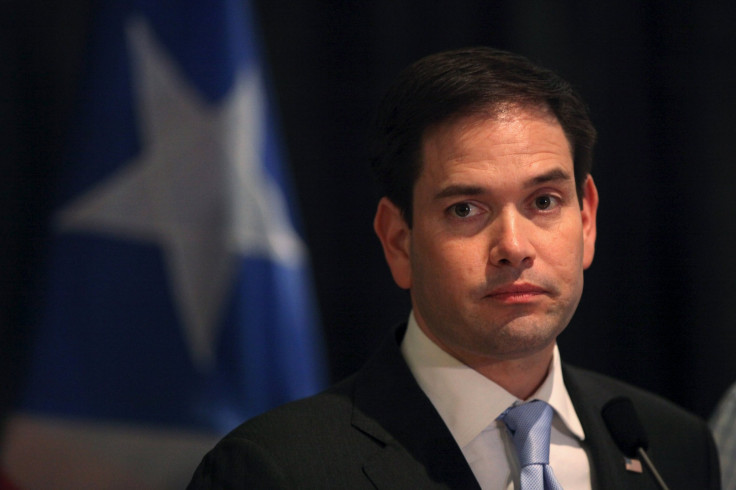Puerto Rico Caucus Live Updates 2016: Results For GOP Vote

UPDATE 6:45 p.m. EST — Following his win in the Puerto Rico caucus Sunday, Florida Sen. and Republican presidential candidate Marco Rubio took to Twitter to thank voters in the U.S. territory. It marked just the second victory for Rubio during the primary election cycle.
In terms of delegates, Rubio still trails front-runner Donald Trump and second-place Ted Cruz by a wide margin.
Thank you, Puerto Rico!
— Marco Rubio (@marcorubio) March 6, 2016
¡Gracias, Puerto Rico! pic.twitter.com/K4lnUfyUix
UPDATE 5:30 p.m. EST — Florida Sen. Marco Rubio has been declared the projected winner in the Republican Puerto Rico Caucus by nearly all news outlets and is widely expected to win all 23 delegates. The relatively small victory in the U.S. territory would push Rubio to 151 delegates, still a long haul from front-runner Donald Trump and second-place Texas Sen. Ted Cruz. Puerto Ricans do not vote in the presidential general election but take part in the nominating process.
Rubio's victory could be a good sign for a key March 15 primary in his home state of Florida, which has the second-largest Puerto Rican population in the U.S. The Florida Sen. campaigned in the U.S. territory Saturday, emphasizing his support for the island holding a referendum on statehood and discussed Puerto Rico's ongoing debt crisis, which he said should be solved without being bailed out by the U.S. government.
Looks like Rubio will indeed win every delegate out of Puerto Rico.
— Decision Desk HQ (@DecisionDeskHQ) March 6, 2016
The victory Sunday for Rubio came after a disappointing Saturday for the candidate, during which Trump won in Kentucky and Louisiana, while Cruz won in Kansas and Maine. The New York City billionaire is leading with 382 delegates, followed by Cruz at 300 delegates.
Trump called for the senator to drop out after Saturday saying, “I think it's time for Marco to clean the deck. I do. And I say that respectfully,” Trump said.
The Florida Sen. had campaigned in the U.S. territory Saturday, emphasizing his support for the island holding a referendum on statehood and discussed Puerto Rico's ongoing debt crisis, which he said should be solved without being bailed out by the U.S. government. Rubio's victory Sunday could be a good sign for a key March 15 primary in his home state of Florida, which has the second-largest Puerto Rican population in the U.S.
.@marcorubio projected to win the Puerto Rico primary, earning all 23 delegates! pic.twitter.com/wQlvA6Olcb
— Team Marco (@TeamMarco) March 6, 2016
UPDATE 4:45 p.m. EST — Florida Sen. Marco Rubio has been projected to win Puerto Rico's Republican caucus, according to multiple outlets. With 32 percent of the tally in, CNN had Rubio registering about 75 percent of the votes.
CNN projects @marcorubio will win the GOP Puerto Rico primary https://t.co/71oF3H6C30 #CNNElection https://t.co/KwlNR2h2bX
— CNN (@CNN) March 6, 2016
The Associated Press and NBC News also called it for Rubio. He is on pace to capture the majority of the votes, meaning he would take all 23 delegates. Rubio was followed by businessman Donald Trump, Texas Ted Cruz and Ohio Gov. John Kasich.
The win would be Rubio's second. He also won in Minnesota, but the race has been dominated by Cruz and Trump. Moving forward, Rubio may need a win in Florida, a 99-delegate, winner- take-all-contest in the senator's home state.
UPDATE 4:30 p.m. EST — Louis Fortuño, governor of Puerto Rico from 2008 to 2012 and supporter of Florida Sen. Marco Rubio, shared his congratulations with the Republican presidential candidate Sunday afternoon. He said Rubio would take all 23 delegates from Puerto Rico.
“[Rubio] won big today in Puerto Rico. All 23 delegates will be pledged to him at the GOP convention. On to Cleveland!” Fortuño wrote on Twitter. The win would be welcomed by Rubio who trails behind Donald Trump and Texas Sen. Ted Cruz significantly. Trump has earned 382 delegates, Cruz 300 and Rubio just 128. Rubio will likely look to his home state of Florida, which may be a must-win contest for the senator. The vote is scheduled for March 15.
“Voters of Puerto Rican descent in Florida ought to follow the trend shown today in PR. I urge all to support @marcorubio on March 15th!” Fortuño wrote on Twitter.
Original story:
CNN has Florida Sen. Marco Rubio as the far-and-away favorite in the Republican caucus in Puerto Rico. The network has him earning more than 73 percent of the vote.
The overall GOP front-runner Donald Trump followed well behind at 13 percent, then Texas Sen. Ted Cruz at 9 percent and Kasich at 1.2 percent. Reports had forecast turnout would be low at just about 25,000 people, down from about 130,000 Puerto Ricans who turned out in 2012, overwhelmingly voting for the eventual nominee Mitt Romney, the Atlantic reported.
Should Rubio take a majority of the votes from the caucus he would take all 23 delegates, an important win for the candidate who has lagged behind.
© Copyright IBTimes 2024. All rights reserved.












